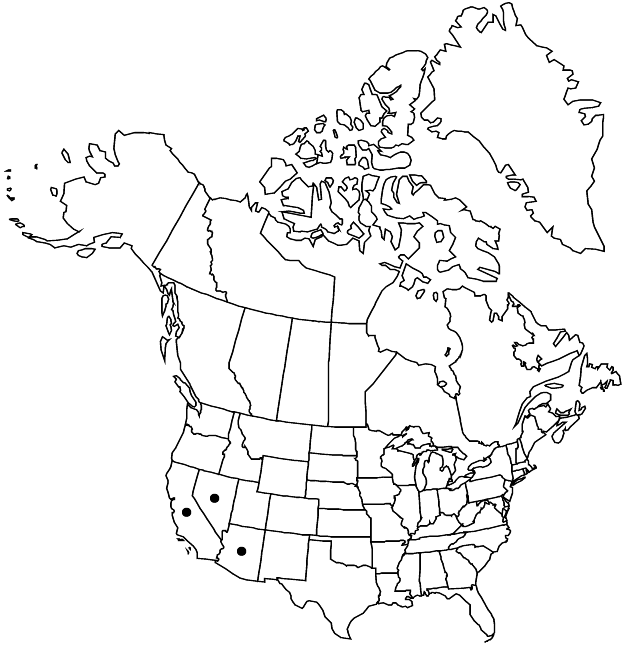Difference between revisions of "Eriogonum panamintense"
J. Wash. Acad. Sci. 25: 308. 1935.
FNA>Volume Importer |
imported>Volume Importer |
||
| (4 intermediate revisions by one other user not shown) | |||
| Line 8: | Line 8: | ||
}} | }} | ||
|common_names=Panamint Mountain wild buckwheat | |common_names=Panamint Mountain wild buckwheat | ||
| + | |special_status={{Treatment/ID/Special_status | ||
| + | |code=E | ||
| + | |label=Endemic | ||
| + | }} | ||
|basionyms= | |basionyms= | ||
|synonyms={{Treatment/ID/Synonym | |synonyms={{Treatment/ID/Synonym | ||
|name=Eriogonum racemosum var. desertorum | |name=Eriogonum racemosum var. desertorum | ||
|authority=S. Stokes | |authority=S. Stokes | ||
| + | |rank=variety | ||
}} {{Treatment/ID/Synonym | }} {{Treatment/ID/Synonym | ||
|name=Eriogonum reliquum | |name=Eriogonum reliquum | ||
|authority=S. Stokes | |authority=S. Stokes | ||
| + | |rank=species | ||
}} | }} | ||
|hierarchy=Polygonaceae;Polygonaceae subfam. Eriogonoideae;Eriogonum;Eriogonum subg. Eucycla;Eriogonum panamintense | |hierarchy=Polygonaceae;Polygonaceae subfam. Eriogonoideae;Eriogonum;Eriogonum subg. Eucycla;Eriogonum panamintense | ||
| Line 39: | Line 45: | ||
-->{{#Taxon: | -->{{#Taxon: | ||
name=Eriogonum panamintense | name=Eriogonum panamintense | ||
| − | |||
|authority=C. V. Morton | |authority=C. V. Morton | ||
|rank=species | |rank=species | ||
| Line 53: | Line 58: | ||
|publication title=J. Wash. Acad. Sci. | |publication title=J. Wash. Acad. Sci. | ||
|publication year=1935 | |publication year=1935 | ||
| − | |special status= | + | |special status=Endemic |
| − | |source xml=https:// | + | |source xml=https://bitbucket.org/aafc-mbb/fna-data-curation/src/2e0870ddd59836b60bcf96646a41e87ea5a5943a/coarse_grained_fna_xml/V5/V5_581.xml |
|subfamily=Polygonaceae subfam. Eriogonoideae | |subfamily=Polygonaceae subfam. Eriogonoideae | ||
|genus=Eriogonum | |genus=Eriogonum | ||
Latest revision as of 22:12, 5 November 2020
Herbs, erect, 1.5–3 × 1–4 dm, tomentose, brownish. Stems slightly spreading to erect, without persistent leaf bases, up to 1/5 height of plant; caudex stems absent; aerial flowering stems erect, slender, solid, not fistulose, 0.5–1.5 dm, tomentose. Leaves basal, 1 per node; petiole 1–5 cm, tomentose; blade elliptic to ovate or obovate, 1.5–4 × 1–2.5 cm, white-tomentose abaxially, less so and often greenish adaxially, margins plane. Inflorescences cymose with involucres racemosely disposed at tips, (10–)12–20 × 1–5 cm; branches dichotomous, tomentose; bracts 3, scalelike, narrowly triangular, and 1–4 mm, or leaflike, elliptic to oval, and 5–15 × 5–15 mm. Peduncles absent. Involucres 1 per node, turbinate, 3–5 × 2–4 mm, tomentose; teeth 5, erect, 0.4–0.8 mm. Flowers 3.5–5 mm; perianth white to whitish brown, glabrous; tepals connate proximal 1/4, monomorphic, oblanceolate; stamens exserted, 3–7 mm; filaments pilose proximally. Achenes light brown, 2.5–3 mm, glabrous.
Phenology: Flowering May–Oct.
Habitat: Rocky to gravelly slopes and ridges, sagebrush and mountain mahogany communities, pinyon-juniper and montane conifer woodlands
Elevation: (1600-)1800-2900 m
Distribution

Ariz., Calif., Nev.
Discussion
Eriogonum panamintense is widely scattered in the desert ranges from the southern tip of the White Mountains in Inyo County to the New York Mountains of San Bernardino County, California, eastward across Nevada in the Magruder and Silver Peak (Esmeralda County), Grapevine (Nye County), and Spring (Charleston) mountains (Clark County) of Nevada, on the Hualapai Mountains south of Kingman, and on Mt. Bangs south of Littlefield, Mohave County, Arizona. The Panamint Mountain wild buckwheat typically grows at elevations in California higher than does E. rupinum, but in Nevada their elevation ranges overlap, as in the Magruder Mountains and near Westgard Pass in the White Mountains.
Selected References
None.